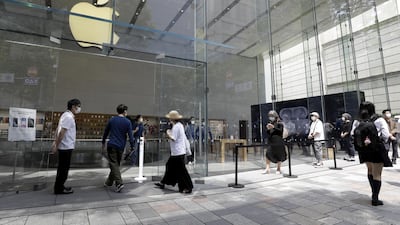Apple will complete the testing of its upcoming iPhone 12 series by the end of this month and will start producing handsets from July, according to a media report.
The company will complete the "second phase of engineering validation and testing for the 5G iPhone 12 models at the end of this month", which will allow mass production to begin in July, Taiwanese technology publication DigiTimes reported.
The report said the assembly of all four new iPhones - set to be unveiled in September - will start at the same time in July. However, it is not clear whether the models will be rolled-out simultaneously or if Apple would opt for a phased launch.
Last year, all three new models of iPhones were revealed and launched together. However, in 2018 Apple introduced the iPhone XR, iPhone XS and iPhone XS Max on the same date in September but the iPhone XR was released on October 26.
Apple did not respond to The National's request for comment.
The Cupertino-based company’s new phones will be the first 5G-enabled handsets from the iPhone manufacturer.
The entry-level phone in the 12 series – the 13.7-centimetre iPhone 12 – will be priced at $649 (Dh2,383), at least $50 cheaper than the entry-level handset in Apple’s 11 series launched last year.
The flagship device of the new series, the iPhone 12 Pro Max, with a 17-centimetre screen, will cost $1,099 while the iPhone 12 and iPhone 12 Pro, both with 15.5-centimetre screens, will be priced at $749 and $999, respectively.
Apple, which has regularly launched new models every September, is facing production delays due to supply chain disruptions amid the coronavirus outbreak, Bank of America analysts said earlier this year.
Manufacturing of higher-end models in the new series could be “pushed back” due to the “production challenges”, Ming-Chi Kuo, an analyst at Hong Kong’s TF International Securities, also wrote in a research note to clients.
He said one of the main reasons behind the delay could be the antenna-in-package design changes, which were introduced by Apple earlier this year.
The iPhone manufacturer is designing its own AIP modules instead of buying them from a third party, which could further delay the manufacturing process. The AIP technology reduces the size of a phone's wireless system and improves connectivity and signal transmission speed.
Apple is yet to officially confirm any production delays.
The company is also reportedly keeping the price of its 5G-enabled iPhones significantly low to attract budget-conscious customers.
Fifth-generation components will raise production costs by up to $100 but Apple will offset the price by “cutting on supply chain expenses”, Mr Kuo said.
In April, Apple launched its cheapest model, iPhone SE, at $399. Cheaper offerings may help the iPhone maker compete with mid-range models from rivals Samsung and Huawei and to meet its goal of 200 million shipments this year.
The company is also gradually reopening its retail stores worldwide and returning employees to offices as lockdowns lift.
In an internal memo on Tuesday, Apple told its staff that the first phase of return to its headquarters Apple Park and other offices will begin on June 15, but specified most employees won’t go back for several months at least.
The first phase will be “very limited” and workers will only be allowed in the office on certain days depending on their job, according to Bloomberg.


